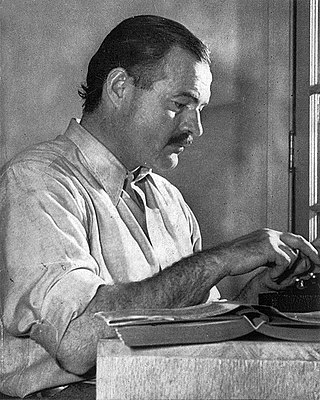
Ernest Miller Hemingway was an American novelist, short-story writer and journalist. Best known for an economical, understated style that significantly influenced later 20th-century writers, he is often romanticized for his adventurous lifestyle, and outspoken and blunt public image. Most of Hemingway's works were published between the mid-1920s and mid-1950s, including seven novels, six short-story collections and two non-fiction works. His writings have become classics of American literature; he was awarded the 1954 Nobel Prize in Literature, while three of his novels, four short-story collections and three nonfiction works were published posthumously.

A Moveable Feast is a 1964 memoir by American author Ernest Hemingway about his years as a struggling expatriate journalist and writer in Paris during the 1920s. It was published posthumously. The book details Hemingway's first marriage to Hadley Richardson and his associations with other cultural figures of the Lost Generation in Interwar France.
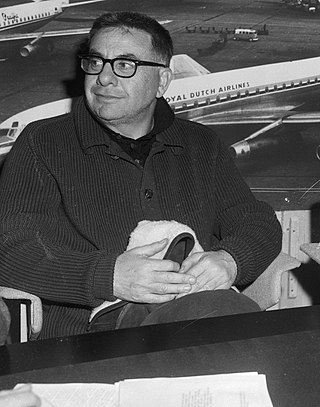
Martin Ritt was an American director, producer, and actor, active in film, theatre and television. He was known mainly as an auteur of socially-conscious dramas and literary adaptations, described by Stanley Kauffmann as "one of the most underrated American directors, superbly competent and quietly imaginative."

Jerome Irving Wald was an American screenwriter and a producer of films and radio programs.
"The Killers" is a short story by Ernest Hemingway, first published in Scribner's Magazine in 1927 and later republished in Men Without Women,Snows of Kilimanjaro, and The Nick Adams Stories. Set in 1920s Summit, Illinois, the story follows recurring Hemingway character Nick Adams as he has a run-in with a pair of hitmen, who are seeking to kill a boxer, in a local restaurant.
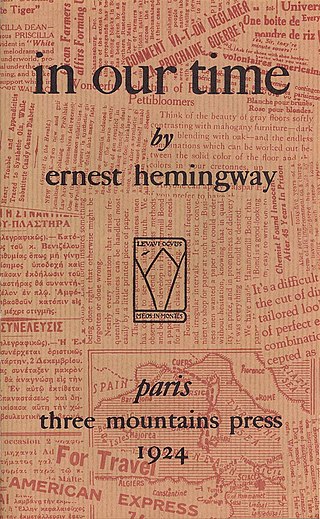
In Our Time is the title of Ernest Hemingway's first collection of short stories, published in 1925 by Boni & Liveright, New York, and of a collection of vignettes published in 1924 in France titled in our time. Its title is derived from the English Book of Common Prayer, "Give peace in our time, O Lord".

Across the River and Into the Trees is a novel by American writer Ernest Hemingway, published by Charles Scribner's Sons in 1950, after first being serialized in Cosmopolitan magazine earlier that year. The title is derived from the last words of U.S. Civil War Confederate General Thomas J. "Stonewall" Jackson: “Let us cross over the river and rest under the shade of the trees.”

George Richard Beymer Jr. is an American actor, filmmaker and artist who played the roles of Tony in the film version of West Side Story (1961), Peter in The Diary of Anne Frank (1959), and Ben Horne on the television series Twin Peaks.
Nicholas Adams is a fictional character, the protagonist of two dozen short stories and vignettes written in the 1920s and 1930s by American author Ernest Hemingway. Adams is partly inspired by Hemingway's own experiences, from his summers in Northern Michigan at his family cottage to his service in the Red Cross ambulance corps in World War I. The first of Hemingway's stories to feature Nick Adams was published in his 1925 collection In Our Time, with Adams appearing as a young child in "Indian Camp", the collection's first story.
"A Clean, Well-Lighted Place" is a short story by American author Ernest Hemingway, first published in Scribner's Magazine in 1933; it was also included in his collection Winner Take Nothing (1933).

"Big Two-Hearted River" is a two-part short story written by American author Ernest Hemingway, published in the 1925 Boni & Liveright edition of In Our Time, the first American volume of Hemingway's short stories. It features a single protagonist, Hemingway's recurrent autobiographical character Nick Adams, whose speaking voice is heard just three times. The story explores the destructive qualities of war which is countered by the healing and regenerative powers of nature. When it was published, critics praised Hemingway's sparse writing style and it became an important work in his canon.
Aaron Edward Hotchner was an American editor, novelist, playwright, and biographer. He wrote many television screenplays as well as noted biographies of Doris Day and Ernest Hemingway. He co-founded the charity food company Newman's Own with actor Paul Newman.
The 20th Golden Globe Awards, honoring the best in film and television for 1962, were held on March 5, 1963.

Ernest Hemingway (1899–1961) was an American novelist, short-story writer, journalist, and sportsman. His economical and understated style—which he termed the iceberg theory—had a strong influence on 20th-century fiction. Many of his works are considered classics of American literature.

The Stripper is a 1963 American drama film about a struggling, aging actress-turned-stripper, played by Joanne Woodward, and the people she knows. It is based on the play A Loss of Roses by William Inge.

"The Doctor and the Doctor's Wife" is a short story by Ernest Hemingway, published in the 1925 New York edition of In Our Time, by Boni & Liveright. The story is the second in the collection to feature Nick Adams, Hemingway's autobiographical alter ego. "The Doctor and the Doctor's Wife" follows "Indian Camp" in the collection, includes elements of the same style and themes, yet is written in counterpoint to the first story.
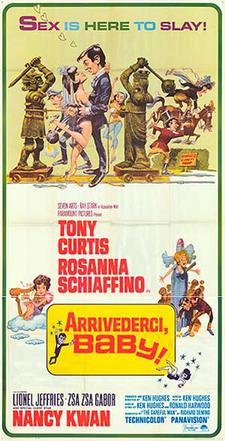
Drop Dead Darling is a 1966 British-American black comedy film directed by Ken Hughes and starring Tony Curtis, Rosanna Schiaffino, Lionel Jeffries and Zsa Zsa Gabor.
On Writing is a story fragment written by Ernest Hemingway which he omitted from the end of his short story, "Big Two-Hearted River", when it was published in 1925 in In Our Time. It was then published after Hemingway's death in the 1972 collection The Nick Adams Stories.
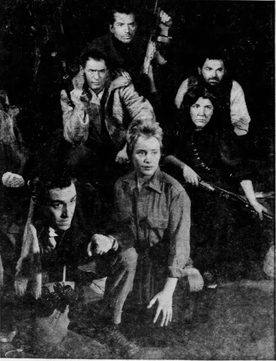
"For Whom the Bell Tolls" was an American television play broadcast in two parts on March 12 and March 19, 1959, as part of the CBS television series, Playhouse 90. It is a television adaptation of the 1940 novel by Ernest Hemingway. John Frankenheimer was the director. The cast included Jason Robards, Maria Schell, and Maureen Stapleton.
"A Pursuit Race" is a 1927 short story by American writer Ernest Hemingway. It was published in the collection Men Without Women.












